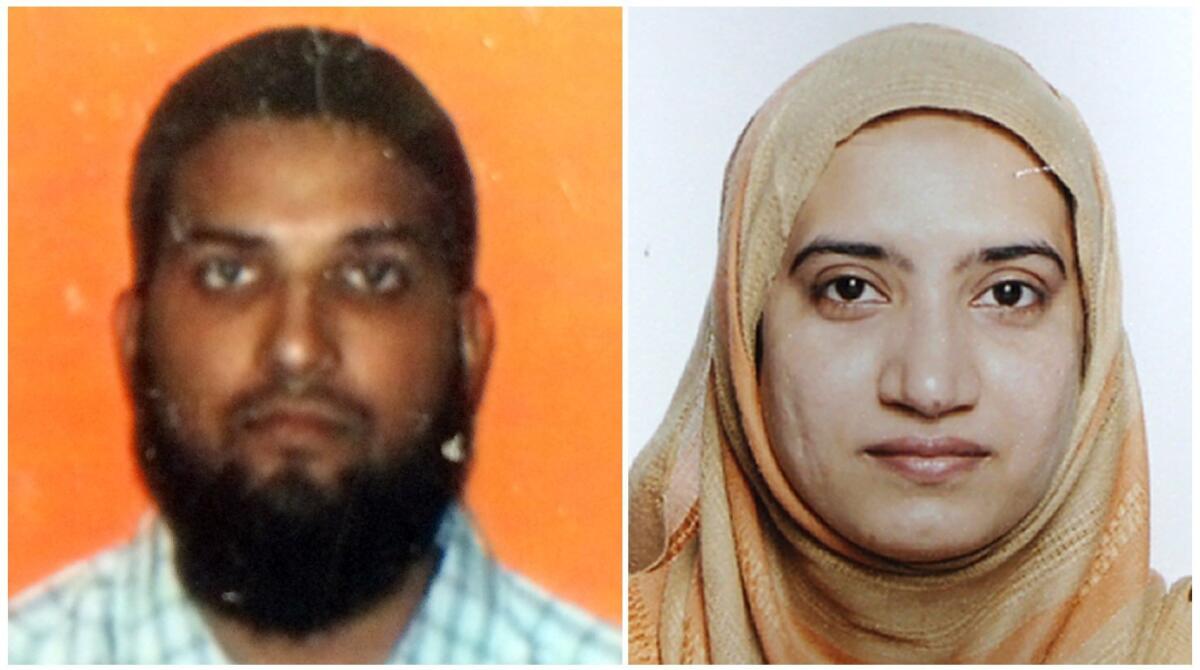San Bernardino attack: What does Islamic State’s messaging mean?

Syed Rizwan Farook, left, and Tashfeen Malik, the assailants in the San Bernardino shootings.
- Share via
Reporting from CAIRO — A radio station and a website affiliated with Islamic State have claimed that the couple who carried out the San Bernardino mass shooting Wednesday were ”supporters” of the Middle East-based militant group.
But neither of the statements claim Islamic State was responsible for the rampage at the Inland Regional Center that left 14 dead and 21 wounded.
Unlike the usual responsibility claim format that Islamic State has used to disseminate information, the announcement came first through its official Al Bayan radio station, believed to broadcasting from Iraq. The information then was published as a news story on the A’maq agency website.
And unlike with previous claims, the story did not elaborate on details of the attack or add a warning to an attacked country on the motivation behind the bloodshed. Such had been the case, for example, after the recent Paris terrorist attacks.
Here is a translation of what was disseminated by the Islamic State affiliates:
Two of the supporters of the IS attacked a center in the city of San Bernardino in the state of California.
And the two attackers opened fire inside the center which led to the killing of 14 people and the wounding of 17 others and then they escaped before they were killed at a later time after exchanging fire with the American police that pursued for a number of hours.
The attackers are a married couple of Pakistani origin, and the attack comes in the wake of statement by American officials that the U.S. is far from “terrorist attacks.”
And the operation comes after the bloody Paris attacks that were carried out by the fighters of the IS on the 13th of November, which killed tens of people, and after a suicide operation against presidential security in the middle of the Tunisian capital.
FULL COVERAGE: Rampage in San Bernardino >>
Since the formation of Islamic State, the group has used various means of online and off-line media channels to convey its messages and statements, especially when it comes to claiming responsibility for terrorist acts.
Islamic State’s beginning witnessed the use of thousands of Twitter accounts to issue statements and other messages threatening attacks or claiming responsibility. Such accounts have been deactivated or shut down. Islamic State has continued to stress that it has no official Twitter account, but rather a number of affiliated accounts that post its statements.
Militant Islamist websites later taken off line were also deployed by the group to issue Islamic State messages. Some of these websites existed before Islamic State’s formation and were used back then to announce assaults carried out by extremist groups including Al Qaeda.
In the last 18 months, Twitter claims of responsibility have been announced in a standard format, including a statement, the group’s logo and mention of the faction that carried out the attack. Most such Twitter accounts have since vanished.
In January, the group established its own online television channel, called Khilafah TV, which operated for several months before being halted as a result of online streaming difficulties. Al Bayan radio, Islamic State’s official radio station, covers a region spanning from Iraq to Tunisia.
The group has also maintained several Internet portals and its most sophisticated media, the Dabiq online magazine.
Hassan is a special correspondent. Special correspondent Nabih Bulos contributed to this report.
MORE ON THE SAN BERNARDINO SHOOTING:
FBI raids home of San Bernardino shooter’s friend over gun purchases
White House: Attackers had no outside support from wider terrorist cell
More to Read
Sign up for Essential California
The most important California stories and recommendations in your inbox every morning.
You may occasionally receive promotional content from the Los Angeles Times.













